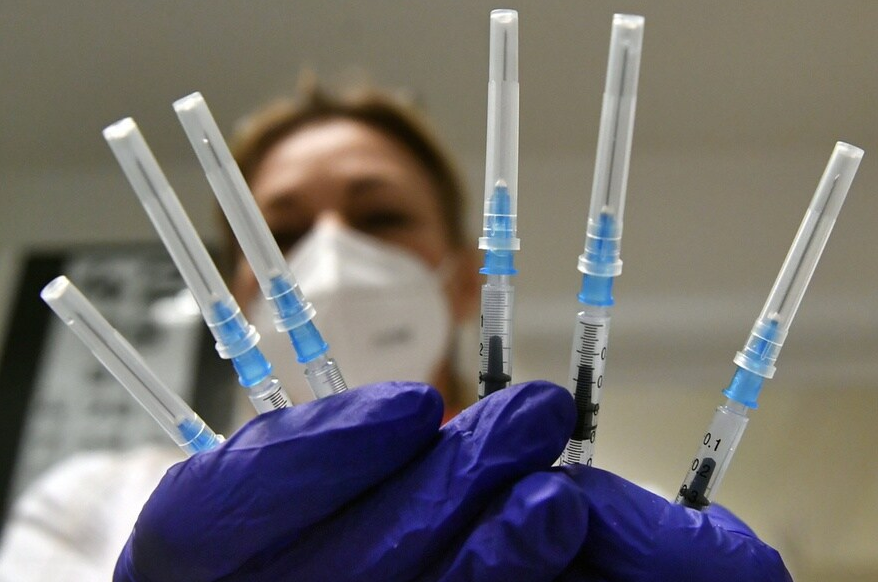
Manufacturing constraints, not logistics, are holding up distribution of vaccines. Keystone / Zoltan Mathe
More than half of adults in rich countries will still be waiting to receive a first dose of coronavirus vaccine in 15 months’ time, the head of a logistics group distributing jabs has warned.
Detlef Trefzger, chief executive of Kuehne+Nagel, one of the world’s largest haulage companies, said: “This already is fast. This sounds shocking for some people, but we have to be realistic.”
Poorer countries, meanwhile, are unlikely to have vaccinated a majority of their populations before 2023, he told the Financial Times.
The Swiss-German haulage giant — which ranks closely behind Germany’s DHL, the world’s biggest freight forwarder — has been contracted by governments and jab makers as a “globally systemic” distributor of vaccines, including those from Moderna and China’s Sinovac, Trefzger said.
He dismissed the notion that distribution bottlenecks were causing problems. “It’s about production, not logistics,” he said, arguing that manufacturing capacity was the main factor limiting supply.
Kuehne+Nagel is also distributing jabs for Covax, a programme backed by the World Health Organization that is providing vaccines free to dozens of developing countries. Kuehne+Nagel shipped the first batch of Covax vaccines — 600,000 doses of the AstraZeneca shot — to Ghana in recent weeks.
“I don’t want to talk about hearsay or the feedback we get, but I would not expect it to be realistic that more than 30-50 per cent of people [would be] vaccinated in the western world before summer next year,” Trefzger said.
Two or three years was an “ambitious timeframe” to distribute doses to vaccinate a majority of those in poorer countries globally, he said.
Adar Poonawalla, head of the Serum Institute of India, the world’s largest vaccine manufacturer, has previously said not enough Covid-19 jabs would be available for everyone in the world until the end of 2024 at the earliest.
As the economic and social damage caused by months of lockdown deepens, western governments in particular have come under growing pressure to increase vaccination efforts — but with mixed success.
The EU has come under fire for failing to procure sufficient doses fast enough. Across the bloc, just 8.8 jabs for every 100 citizens have been administered.
President Joe Biden said this week that the US would have enough vaccine doses to inoculate every adult by the end of May. The UK is aiming to offer every adult their first jab by the end of July.
Trefzger said Kuehne+Nagel stood ready with distribution and storage infrastructure and arrangements in place to roll out billions of doses.
Rival DHL, which distributes the BioNTech/Pfizer vaccine, warned late last year that cold storage facilities in some poorer nations were not up to scratch for safe vaccine handling.
Both DHL and Kuehne+Nagel have insights into vaccine manufacturing capacity thanks to their contracts to distribute finished shots, but also because they are leading suppliers of raw materials to vaccine makers.
Trefzger praised the speed with which vaccines have been developed. “Before autumn last year, the world did not think it would be possible to have vaccines at all, and now we have three [approved] from western pharma companies, a fourth close, and we have two from the east, one from China and one from Russia,” he said.
“It’s not a finger-pointing remark [to say production is still not big enough], it’s more [understanding that] it will simply take time . . . we need 10bn-15bn doses to vaccinate the globe and at the moment we are still far away from [that] . . . It will take time . . . but we are ready.”
Vaccine output will rise to between five and seven times its current level in the next quarter, Trefzger forecast.
Regardless of production capacity, he also had doubts as to whether some governments in Europe were fully ready themselves to administer doses.
“In Europe we are too strict with our rules. Other countries show that if you want you can get your injections in the supermarkets or [from] your normal doctor. We have so many rules and we are so over-engineered — I’m talking Germany more than anybody else [in Europe] — that there will be no mass vaccination if we continue like this.”
“The big problem is people management: how you register people, how you order doses to the right locations and how you are invited to come for your jabs,” Trefzger said.
Excess supplies of vaccines are already building up at immunisation sites in Germany. The country has an estimated 2.3m shots that have been distributed, but have not been used.
In results reported last week, Kuehne+Nagel’s earnings rose 5 per cent to $2bn, boosted by sky-high airfreight charges. Revenues for the logistics giant were down slightly more than 3 per cent to $22bn, largely owing to a lockdown-induced slowdown in manufacturing trade.
Copyright The Financial Times Limited 2021
Full story here Are you the author? Previous post See more for Next postTags: Featured,Health,newsletter































